Auditing and Assurance: Professional Ethics and Standards
VerifiedAdded on 2023/06/13
|11
|3273
|381
AI Summary
This content discusses various scenarios where professional ethics and standards are violated in auditing and assurance. It also provides solutions and recommendations for each scenario. The subject is auditing and assurance, and the course code and college/university are not mentioned.
Contribute Materials
Your contribution can guide someone’s learning journey. Share your
documents today.
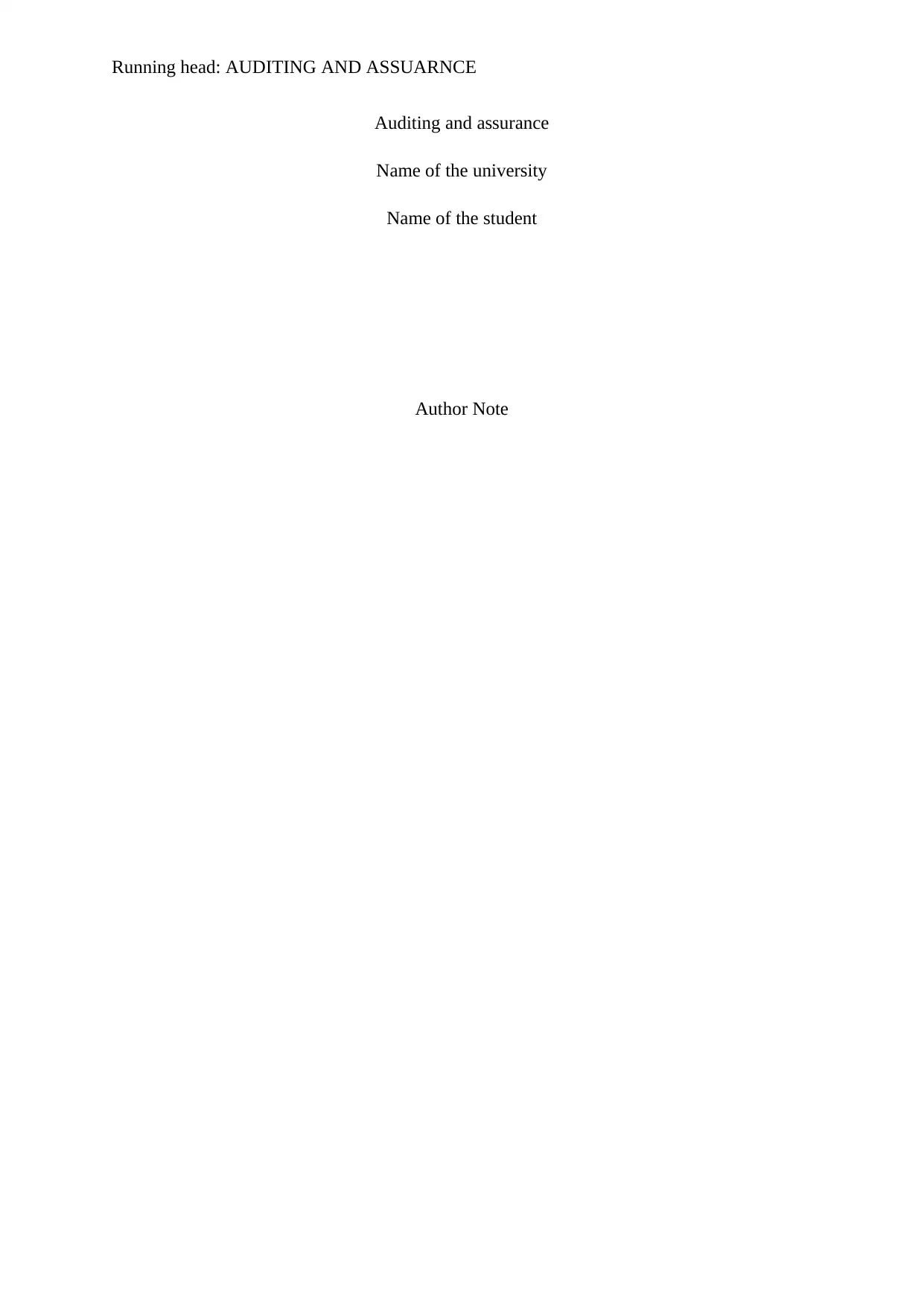
Running head: AUDITING AND ASSUARNCE
Auditing and assurance
Name of the university
Name of the student
Author Note
Auditing and assurance
Name of the university
Name of the student
Author Note
Secure Best Marks with AI Grader
Need help grading? Try our AI Grader for instant feedback on your assignments.
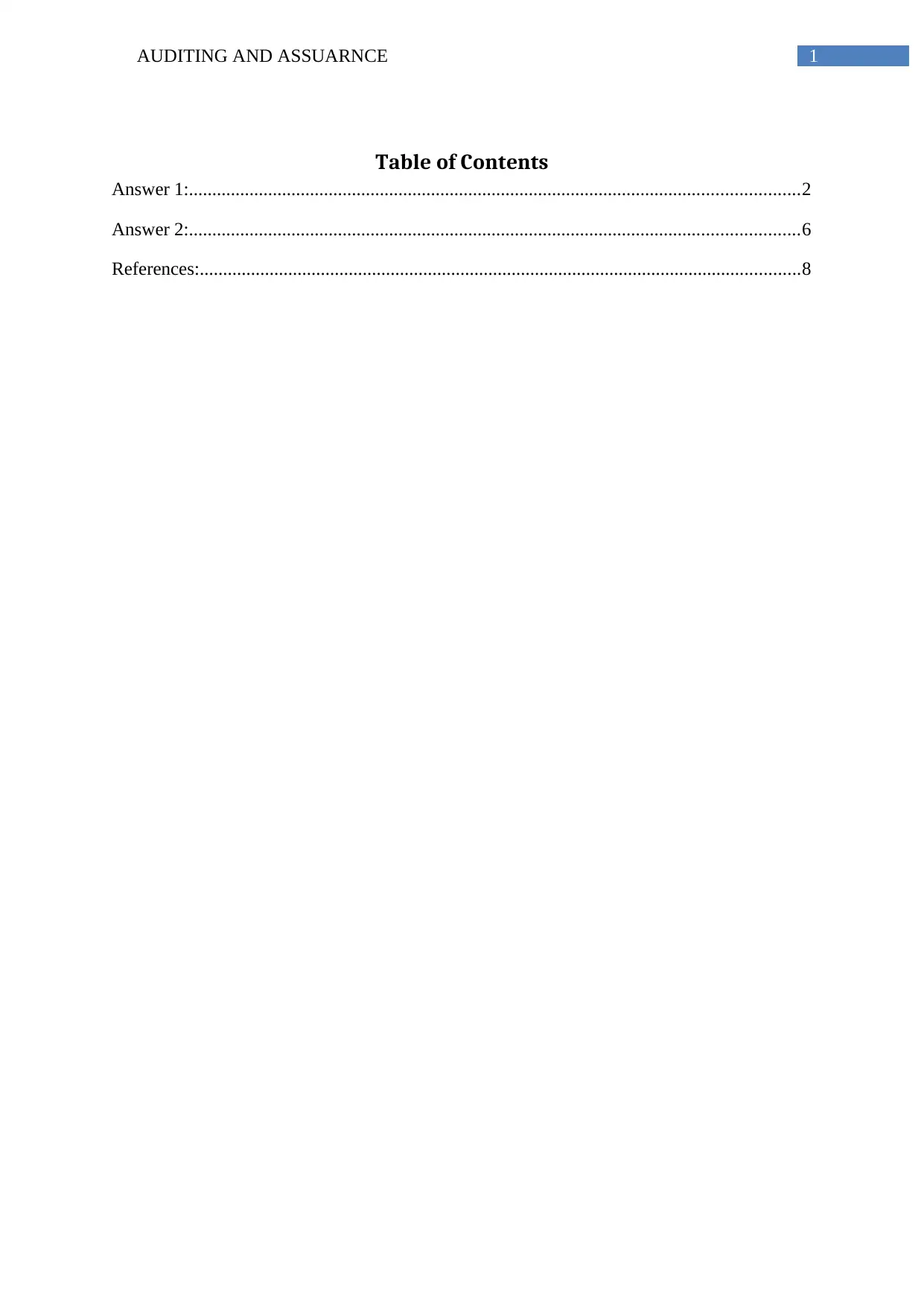
1AUDITING AND ASSUARNCE
Table of Contents
Answer 1:...................................................................................................................................2
Answer 2:...................................................................................................................................6
References:.................................................................................................................................8
Table of Contents
Answer 1:...................................................................................................................................2
Answer 2:...................................................................................................................................6
References:.................................................................................................................................8
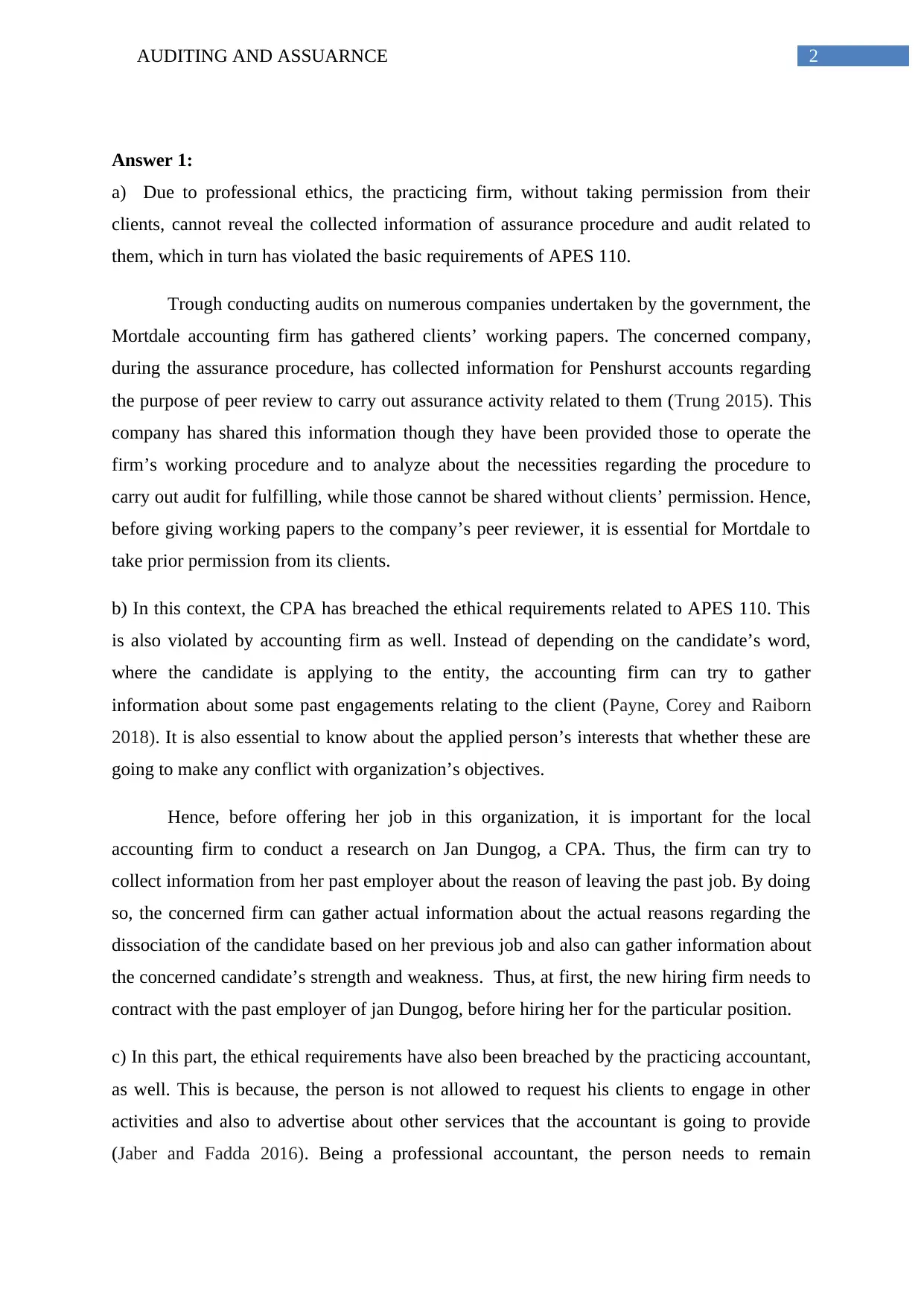
2AUDITING AND ASSUARNCE
Answer 1:
a) Due to professional ethics, the practicing firm, without taking permission from their
clients, cannot reveal the collected information of assurance procedure and audit related to
them, which in turn has violated the basic requirements of APES 110.
Trough conducting audits on numerous companies undertaken by the government, the
Mortdale accounting firm has gathered clients’ working papers. The concerned company,
during the assurance procedure, has collected information for Penshurst accounts regarding
the purpose of peer review to carry out assurance activity related to them (Trung 2015). This
company has shared this information though they have been provided those to operate the
firm’s working procedure and to analyze about the necessities regarding the procedure to
carry out audit for fulfilling, while those cannot be shared without clients’ permission. Hence,
before giving working papers to the company’s peer reviewer, it is essential for Mortdale to
take prior permission from its clients.
b) In this context, the CPA has breached the ethical requirements related to APES 110. This
is also violated by accounting firm as well. Instead of depending on the candidate’s word,
where the candidate is applying to the entity, the accounting firm can try to gather
information about some past engagements relating to the client (Payne, Corey and Raiborn
2018). It is also essential to know about the applied person’s interests that whether these are
going to make any conflict with organization’s objectives.
Hence, before offering her job in this organization, it is important for the local
accounting firm to conduct a research on Jan Dungog, a CPA. Thus, the firm can try to
collect information from her past employer about the reason of leaving the past job. By doing
so, the concerned firm can gather actual information about the actual reasons regarding the
dissociation of the candidate based on her previous job and also can gather information about
the concerned candidate’s strength and weakness. Thus, at first, the new hiring firm needs to
contract with the past employer of jan Dungog, before hiring her for the particular position.
c) In this part, the ethical requirements have also been breached by the practicing accountant,
as well. This is because, the person is not allowed to request his clients to engage in other
activities and also to advertise about other services that the accountant is going to provide
(Jaber and Fadda 2016). Being a professional accountant, the person needs to remain
Answer 1:
a) Due to professional ethics, the practicing firm, without taking permission from their
clients, cannot reveal the collected information of assurance procedure and audit related to
them, which in turn has violated the basic requirements of APES 110.
Trough conducting audits on numerous companies undertaken by the government, the
Mortdale accounting firm has gathered clients’ working papers. The concerned company,
during the assurance procedure, has collected information for Penshurst accounts regarding
the purpose of peer review to carry out assurance activity related to them (Trung 2015). This
company has shared this information though they have been provided those to operate the
firm’s working procedure and to analyze about the necessities regarding the procedure to
carry out audit for fulfilling, while those cannot be shared without clients’ permission. Hence,
before giving working papers to the company’s peer reviewer, it is essential for Mortdale to
take prior permission from its clients.
b) In this context, the CPA has breached the ethical requirements related to APES 110. This
is also violated by accounting firm as well. Instead of depending on the candidate’s word,
where the candidate is applying to the entity, the accounting firm can try to gather
information about some past engagements relating to the client (Payne, Corey and Raiborn
2018). It is also essential to know about the applied person’s interests that whether these are
going to make any conflict with organization’s objectives.
Hence, before offering her job in this organization, it is important for the local
accounting firm to conduct a research on Jan Dungog, a CPA. Thus, the firm can try to
collect information from her past employer about the reason of leaving the past job. By doing
so, the concerned firm can gather actual information about the actual reasons regarding the
dissociation of the candidate based on her previous job and also can gather information about
the concerned candidate’s strength and weakness. Thus, at first, the new hiring firm needs to
contract with the past employer of jan Dungog, before hiring her for the particular position.
c) In this part, the ethical requirements have also been breached by the practicing accountant,
as well. This is because, the person is not allowed to request his clients to engage in other
activities and also to advertise about other services that the accountant is going to provide
(Jaber and Fadda 2016). Being a professional accountant, the person needs to remain
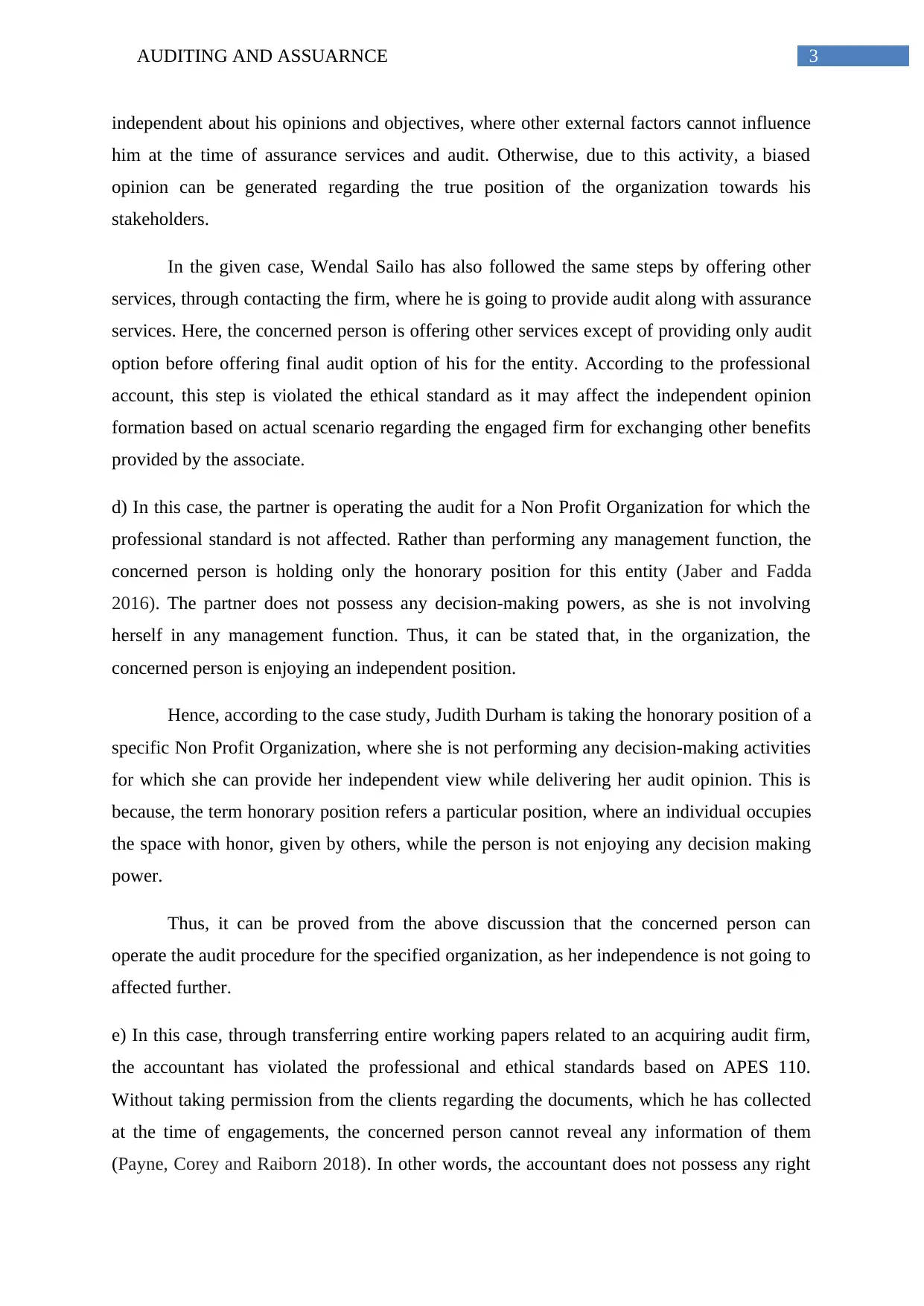
3AUDITING AND ASSUARNCE
independent about his opinions and objectives, where other external factors cannot influence
him at the time of assurance services and audit. Otherwise, due to this activity, a biased
opinion can be generated regarding the true position of the organization towards his
stakeholders.
In the given case, Wendal Sailo has also followed the same steps by offering other
services, through contacting the firm, where he is going to provide audit along with assurance
services. Here, the concerned person is offering other services except of providing only audit
option before offering final audit option of his for the entity. According to the professional
account, this step is violated the ethical standard as it may affect the independent opinion
formation based on actual scenario regarding the engaged firm for exchanging other benefits
provided by the associate.
d) In this case, the partner is operating the audit for a Non Profit Organization for which the
professional standard is not affected. Rather than performing any management function, the
concerned person is holding only the honorary position for this entity (Jaber and Fadda
2016). The partner does not possess any decision-making powers, as she is not involving
herself in any management function. Thus, it can be stated that, in the organization, the
concerned person is enjoying an independent position.
Hence, according to the case study, Judith Durham is taking the honorary position of a
specific Non Profit Organization, where she is not performing any decision-making activities
for which she can provide her independent view while delivering her audit opinion. This is
because, the term honorary position refers a particular position, where an individual occupies
the space with honor, given by others, while the person is not enjoying any decision making
power.
Thus, it can be proved from the above discussion that the concerned person can
operate the audit procedure for the specified organization, as her independence is not going to
affected further.
e) In this case, through transferring entire working papers related to an acquiring audit firm,
the accountant has violated the professional and ethical standards based on APES 110.
Without taking permission from the clients regarding the documents, which he has collected
at the time of engagements, the concerned person cannot reveal any information of them
(Payne, Corey and Raiborn 2018). In other words, the accountant does not possess any right
independent about his opinions and objectives, where other external factors cannot influence
him at the time of assurance services and audit. Otherwise, due to this activity, a biased
opinion can be generated regarding the true position of the organization towards his
stakeholders.
In the given case, Wendal Sailo has also followed the same steps by offering other
services, through contacting the firm, where he is going to provide audit along with assurance
services. Here, the concerned person is offering other services except of providing only audit
option before offering final audit option of his for the entity. According to the professional
account, this step is violated the ethical standard as it may affect the independent opinion
formation based on actual scenario regarding the engaged firm for exchanging other benefits
provided by the associate.
d) In this case, the partner is operating the audit for a Non Profit Organization for which the
professional standard is not affected. Rather than performing any management function, the
concerned person is holding only the honorary position for this entity (Jaber and Fadda
2016). The partner does not possess any decision-making powers, as she is not involving
herself in any management function. Thus, it can be stated that, in the organization, the
concerned person is enjoying an independent position.
Hence, according to the case study, Judith Durham is taking the honorary position of a
specific Non Profit Organization, where she is not performing any decision-making activities
for which she can provide her independent view while delivering her audit opinion. This is
because, the term honorary position refers a particular position, where an individual occupies
the space with honor, given by others, while the person is not enjoying any decision making
power.
Thus, it can be proved from the above discussion that the concerned person can
operate the audit procedure for the specified organization, as her independence is not going to
affected further.
e) In this case, through transferring entire working papers related to an acquiring audit firm,
the accountant has violated the professional and ethical standards based on APES 110.
Without taking permission from the clients regarding the documents, which he has collected
at the time of engagements, the concerned person cannot reveal any information of them
(Payne, Corey and Raiborn 2018). In other words, the accountant does not possess any right
Secure Best Marks with AI Grader
Need help grading? Try our AI Grader for instant feedback on your assignments.
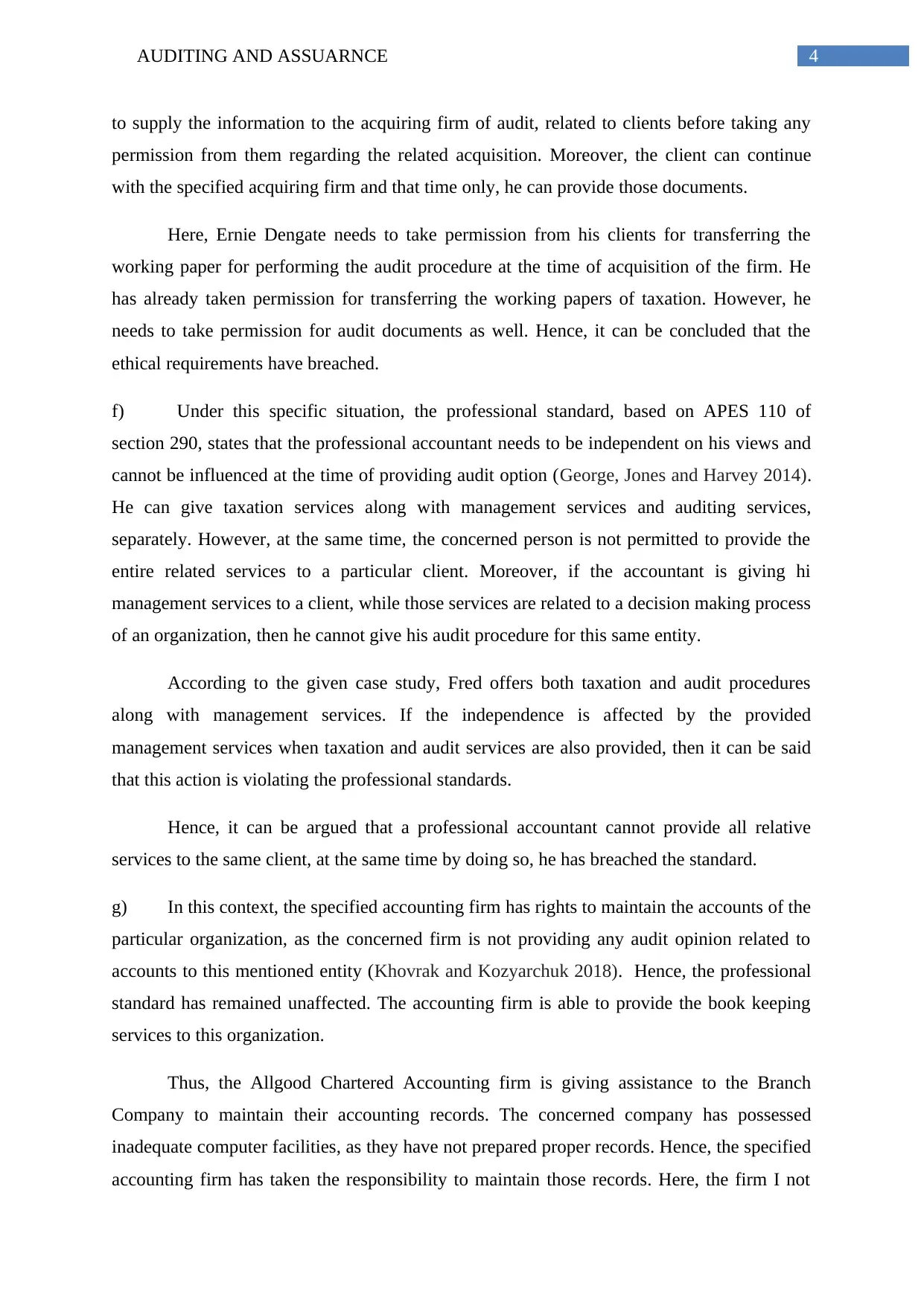
4AUDITING AND ASSUARNCE
to supply the information to the acquiring firm of audit, related to clients before taking any
permission from them regarding the related acquisition. Moreover, the client can continue
with the specified acquiring firm and that time only, he can provide those documents.
Here, Ernie Dengate needs to take permission from his clients for transferring the
working paper for performing the audit procedure at the time of acquisition of the firm. He
has already taken permission for transferring the working papers of taxation. However, he
needs to take permission for audit documents as well. Hence, it can be concluded that the
ethical requirements have breached.
f) Under this specific situation, the professional standard, based on APES 110 of
section 290, states that the professional accountant needs to be independent on his views and
cannot be influenced at the time of providing audit option (George, Jones and Harvey 2014).
He can give taxation services along with management services and auditing services,
separately. However, at the same time, the concerned person is not permitted to provide the
entire related services to a particular client. Moreover, if the accountant is giving hi
management services to a client, while those services are related to a decision making process
of an organization, then he cannot give his audit procedure for this same entity.
According to the given case study, Fred offers both taxation and audit procedures
along with management services. If the independence is affected by the provided
management services when taxation and audit services are also provided, then it can be said
that this action is violating the professional standards.
Hence, it can be argued that a professional accountant cannot provide all relative
services to the same client, at the same time by doing so, he has breached the standard.
g) In this context, the specified accounting firm has rights to maintain the accounts of the
particular organization, as the concerned firm is not providing any audit opinion related to
accounts to this mentioned entity (Khovrak and Kozyarchuk 2018). Hence, the professional
standard has remained unaffected. The accounting firm is able to provide the book keeping
services to this organization.
Thus, the Allgood Chartered Accounting firm is giving assistance to the Branch
Company to maintain their accounting records. The concerned company has possessed
inadequate computer facilities, as they have not prepared proper records. Hence, the specified
accounting firm has taken the responsibility to maintain those records. Here, the firm I not
to supply the information to the acquiring firm of audit, related to clients before taking any
permission from them regarding the related acquisition. Moreover, the client can continue
with the specified acquiring firm and that time only, he can provide those documents.
Here, Ernie Dengate needs to take permission from his clients for transferring the
working paper for performing the audit procedure at the time of acquisition of the firm. He
has already taken permission for transferring the working papers of taxation. However, he
needs to take permission for audit documents as well. Hence, it can be concluded that the
ethical requirements have breached.
f) Under this specific situation, the professional standard, based on APES 110 of
section 290, states that the professional accountant needs to be independent on his views and
cannot be influenced at the time of providing audit option (George, Jones and Harvey 2014).
He can give taxation services along with management services and auditing services,
separately. However, at the same time, the concerned person is not permitted to provide the
entire related services to a particular client. Moreover, if the accountant is giving hi
management services to a client, while those services are related to a decision making process
of an organization, then he cannot give his audit procedure for this same entity.
According to the given case study, Fred offers both taxation and audit procedures
along with management services. If the independence is affected by the provided
management services when taxation and audit services are also provided, then it can be said
that this action is violating the professional standards.
Hence, it can be argued that a professional accountant cannot provide all relative
services to the same client, at the same time by doing so, he has breached the standard.
g) In this context, the specified accounting firm has rights to maintain the accounts of the
particular organization, as the concerned firm is not providing any audit opinion related to
accounts to this mentioned entity (Khovrak and Kozyarchuk 2018). Hence, the professional
standard has remained unaffected. The accounting firm is able to provide the book keeping
services to this organization.
Thus, the Allgood Chartered Accounting firm is giving assistance to the Branch
Company to maintain their accounting records. The concerned company has possessed
inadequate computer facilities, as they have not prepared proper records. Hence, the specified
accounting firm has taken the responsibility to maintain those records. Here, the firm I not
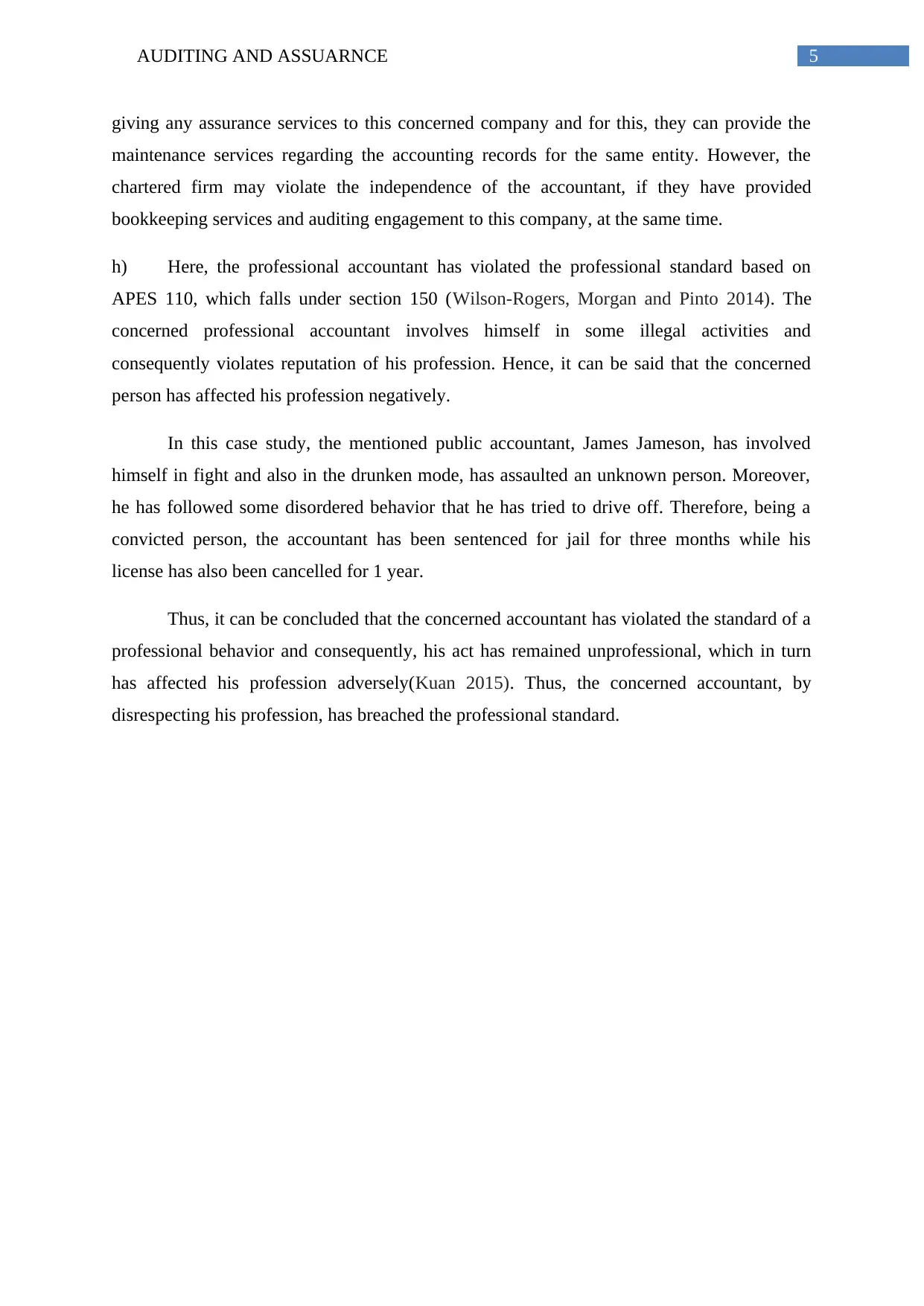
5AUDITING AND ASSUARNCE
giving any assurance services to this concerned company and for this, they can provide the
maintenance services regarding the accounting records for the same entity. However, the
chartered firm may violate the independence of the accountant, if they have provided
bookkeeping services and auditing engagement to this company, at the same time.
h) Here, the professional accountant has violated the professional standard based on
APES 110, which falls under section 150 (Wilson-Rogers, Morgan and Pinto 2014). The
concerned professional accountant involves himself in some illegal activities and
consequently violates reputation of his profession. Hence, it can be said that the concerned
person has affected his profession negatively.
In this case study, the mentioned public accountant, James Jameson, has involved
himself in fight and also in the drunken mode, has assaulted an unknown person. Moreover,
he has followed some disordered behavior that he has tried to drive off. Therefore, being a
convicted person, the accountant has been sentenced for jail for three months while his
license has also been cancelled for 1 year.
Thus, it can be concluded that the concerned accountant has violated the standard of a
professional behavior and consequently, his act has remained unprofessional, which in turn
has affected his profession adversely(Kuan 2015). Thus, the concerned accountant, by
disrespecting his profession, has breached the professional standard.
giving any assurance services to this concerned company and for this, they can provide the
maintenance services regarding the accounting records for the same entity. However, the
chartered firm may violate the independence of the accountant, if they have provided
bookkeeping services and auditing engagement to this company, at the same time.
h) Here, the professional accountant has violated the professional standard based on
APES 110, which falls under section 150 (Wilson-Rogers, Morgan and Pinto 2014). The
concerned professional accountant involves himself in some illegal activities and
consequently violates reputation of his profession. Hence, it can be said that the concerned
person has affected his profession negatively.
In this case study, the mentioned public accountant, James Jameson, has involved
himself in fight and also in the drunken mode, has assaulted an unknown person. Moreover,
he has followed some disordered behavior that he has tried to drive off. Therefore, being a
convicted person, the accountant has been sentenced for jail for three months while his
license has also been cancelled for 1 year.
Thus, it can be concluded that the concerned accountant has violated the standard of a
professional behavior and consequently, his act has remained unprofessional, which in turn
has affected his profession adversely(Kuan 2015). Thus, the concerned accountant, by
disrespecting his profession, has breached the professional standard.
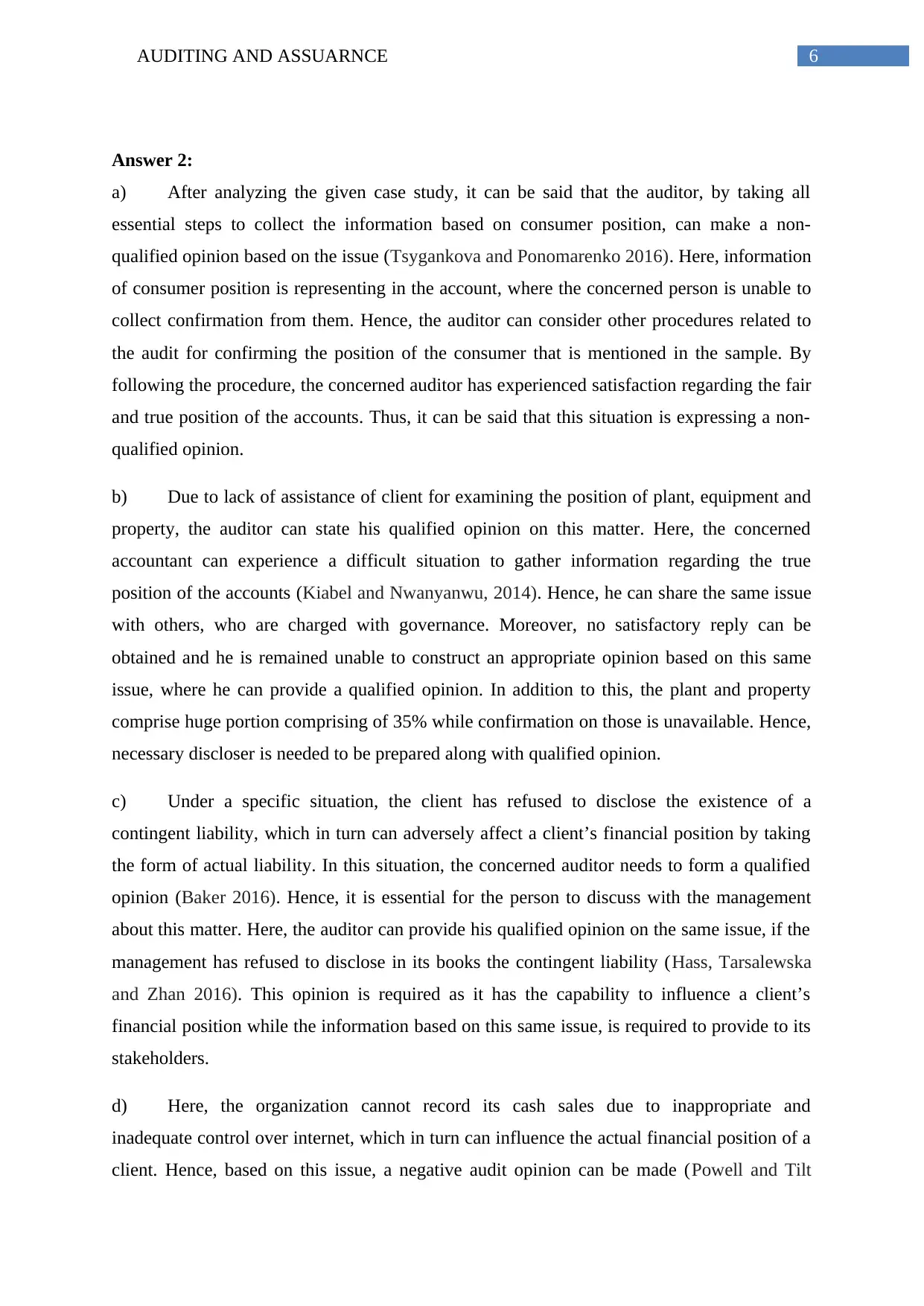
6AUDITING AND ASSUARNCE
Answer 2:
a) After analyzing the given case study, it can be said that the auditor, by taking all
essential steps to collect the information based on consumer position, can make a non-
qualified opinion based on the issue (Tsygankova and Ponomarenko 2016). Here, information
of consumer position is representing in the account, where the concerned person is unable to
collect confirmation from them. Hence, the auditor can consider other procedures related to
the audit for confirming the position of the consumer that is mentioned in the sample. By
following the procedure, the concerned auditor has experienced satisfaction regarding the fair
and true position of the accounts. Thus, it can be said that this situation is expressing a non-
qualified opinion.
b) Due to lack of assistance of client for examining the position of plant, equipment and
property, the auditor can state his qualified opinion on this matter. Here, the concerned
accountant can experience a difficult situation to gather information regarding the true
position of the accounts (Kiabel and Nwanyanwu, 2014). Hence, he can share the same issue
with others, who are charged with governance. Moreover, no satisfactory reply can be
obtained and he is remained unable to construct an appropriate opinion based on this same
issue, where he can provide a qualified opinion. In addition to this, the plant and property
comprise huge portion comprising of 35% while confirmation on those is unavailable. Hence,
necessary discloser is needed to be prepared along with qualified opinion.
c) Under a specific situation, the client has refused to disclose the existence of a
contingent liability, which in turn can adversely affect a client’s financial position by taking
the form of actual liability. In this situation, the concerned auditor needs to form a qualified
opinion (Baker 2016). Hence, it is essential for the person to discuss with the management
about this matter. Here, the auditor can provide his qualified opinion on the same issue, if the
management has refused to disclose in its books the contingent liability (Hass, Tarsalewska
and Zhan 2016). This opinion is required as it has the capability to influence a client’s
financial position while the information based on this same issue, is required to provide to its
stakeholders.
d) Here, the organization cannot record its cash sales due to inappropriate and
inadequate control over internet, which in turn can influence the actual financial position of a
client. Hence, based on this issue, a negative audit opinion can be made (Powell and Tilt
Answer 2:
a) After analyzing the given case study, it can be said that the auditor, by taking all
essential steps to collect the information based on consumer position, can make a non-
qualified opinion based on the issue (Tsygankova and Ponomarenko 2016). Here, information
of consumer position is representing in the account, where the concerned person is unable to
collect confirmation from them. Hence, the auditor can consider other procedures related to
the audit for confirming the position of the consumer that is mentioned in the sample. By
following the procedure, the concerned auditor has experienced satisfaction regarding the fair
and true position of the accounts. Thus, it can be said that this situation is expressing a non-
qualified opinion.
b) Due to lack of assistance of client for examining the position of plant, equipment and
property, the auditor can state his qualified opinion on this matter. Here, the concerned
accountant can experience a difficult situation to gather information regarding the true
position of the accounts (Kiabel and Nwanyanwu, 2014). Hence, he can share the same issue
with others, who are charged with governance. Moreover, no satisfactory reply can be
obtained and he is remained unable to construct an appropriate opinion based on this same
issue, where he can provide a qualified opinion. In addition to this, the plant and property
comprise huge portion comprising of 35% while confirmation on those is unavailable. Hence,
necessary discloser is needed to be prepared along with qualified opinion.
c) Under a specific situation, the client has refused to disclose the existence of a
contingent liability, which in turn can adversely affect a client’s financial position by taking
the form of actual liability. In this situation, the concerned auditor needs to form a qualified
opinion (Baker 2016). Hence, it is essential for the person to discuss with the management
about this matter. Here, the auditor can provide his qualified opinion on the same issue, if the
management has refused to disclose in its books the contingent liability (Hass, Tarsalewska
and Zhan 2016). This opinion is required as it has the capability to influence a client’s
financial position while the information based on this same issue, is required to provide to its
stakeholders.
d) Here, the organization cannot record its cash sales due to inappropriate and
inadequate control over internet, which in turn can influence the actual financial position of a
client. Hence, based on this issue, a negative audit opinion can be made (Powell and Tilt
Paraphrase This Document
Need a fresh take? Get an instant paraphrase of this document with our AI Paraphraser
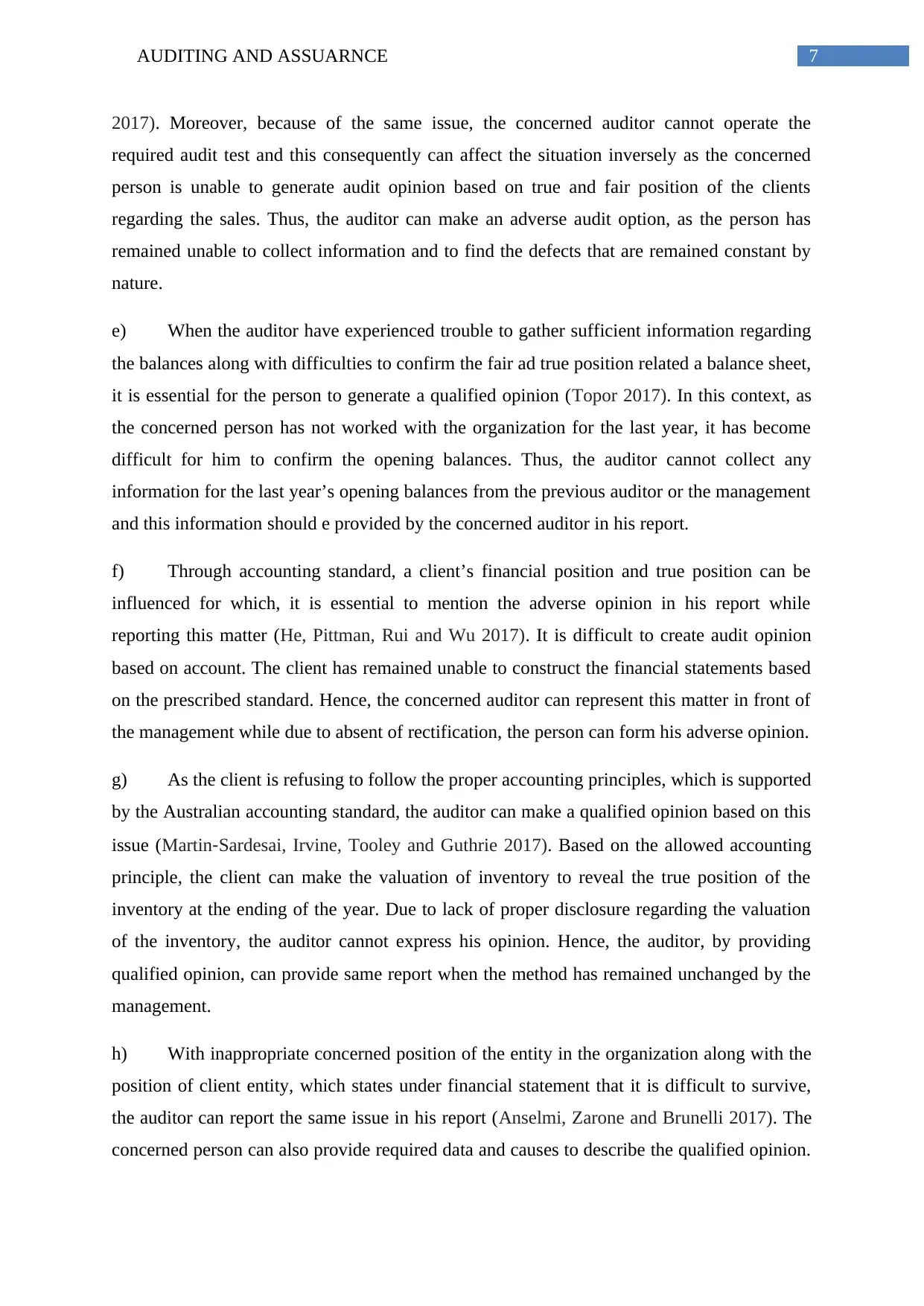
7AUDITING AND ASSUARNCE
2017). Moreover, because of the same issue, the concerned auditor cannot operate the
required audit test and this consequently can affect the situation inversely as the concerned
person is unable to generate audit opinion based on true and fair position of the clients
regarding the sales. Thus, the auditor can make an adverse audit option, as the person has
remained unable to collect information and to find the defects that are remained constant by
nature.
e) When the auditor have experienced trouble to gather sufficient information regarding
the balances along with difficulties to confirm the fair ad true position related a balance sheet,
it is essential for the person to generate a qualified opinion (Topor 2017). In this context, as
the concerned person has not worked with the organization for the last year, it has become
difficult for him to confirm the opening balances. Thus, the auditor cannot collect any
information for the last year’s opening balances from the previous auditor or the management
and this information should e provided by the concerned auditor in his report.
f) Through accounting standard, a client’s financial position and true position can be
influenced for which, it is essential to mention the adverse opinion in his report while
reporting this matter (He, Pittman, Rui and Wu 2017). It is difficult to create audit opinion
based on account. The client has remained unable to construct the financial statements based
on the prescribed standard. Hence, the concerned auditor can represent this matter in front of
the management while due to absent of rectification, the person can form his adverse opinion.
g) As the client is refusing to follow the proper accounting principles, which is supported
by the Australian accounting standard, the auditor can make a qualified opinion based on this
issue (Martin‐Sardesai, Irvine, Tooley and Guthrie 2017). Based on the allowed accounting
principle, the client can make the valuation of inventory to reveal the true position of the
inventory at the ending of the year. Due to lack of proper disclosure regarding the valuation
of the inventory, the auditor cannot express his opinion. Hence, the auditor, by providing
qualified opinion, can provide same report when the method has remained unchanged by the
management.
h) With inappropriate concerned position of the entity in the organization along with the
position of client entity, which states under financial statement that it is difficult to survive,
the auditor can report the same issue in his report (Anselmi, Zarone and Brunelli 2017). The
concerned person can also provide required data and causes to describe the qualified opinion.
2017). Moreover, because of the same issue, the concerned auditor cannot operate the
required audit test and this consequently can affect the situation inversely as the concerned
person is unable to generate audit opinion based on true and fair position of the clients
regarding the sales. Thus, the auditor can make an adverse audit option, as the person has
remained unable to collect information and to find the defects that are remained constant by
nature.
e) When the auditor have experienced trouble to gather sufficient information regarding
the balances along with difficulties to confirm the fair ad true position related a balance sheet,
it is essential for the person to generate a qualified opinion (Topor 2017). In this context, as
the concerned person has not worked with the organization for the last year, it has become
difficult for him to confirm the opening balances. Thus, the auditor cannot collect any
information for the last year’s opening balances from the previous auditor or the management
and this information should e provided by the concerned auditor in his report.
f) Through accounting standard, a client’s financial position and true position can be
influenced for which, it is essential to mention the adverse opinion in his report while
reporting this matter (He, Pittman, Rui and Wu 2017). It is difficult to create audit opinion
based on account. The client has remained unable to construct the financial statements based
on the prescribed standard. Hence, the concerned auditor can represent this matter in front of
the management while due to absent of rectification, the person can form his adverse opinion.
g) As the client is refusing to follow the proper accounting principles, which is supported
by the Australian accounting standard, the auditor can make a qualified opinion based on this
issue (Martin‐Sardesai, Irvine, Tooley and Guthrie 2017). Based on the allowed accounting
principle, the client can make the valuation of inventory to reveal the true position of the
inventory at the ending of the year. Due to lack of proper disclosure regarding the valuation
of the inventory, the auditor cannot express his opinion. Hence, the auditor, by providing
qualified opinion, can provide same report when the method has remained unchanged by the
management.
h) With inappropriate concerned position of the entity in the organization along with the
position of client entity, which states under financial statement that it is difficult to survive,
the auditor can report the same issue in his report (Anselmi, Zarone and Brunelli 2017). The
concerned person can also provide required data and causes to describe the qualified opinion.
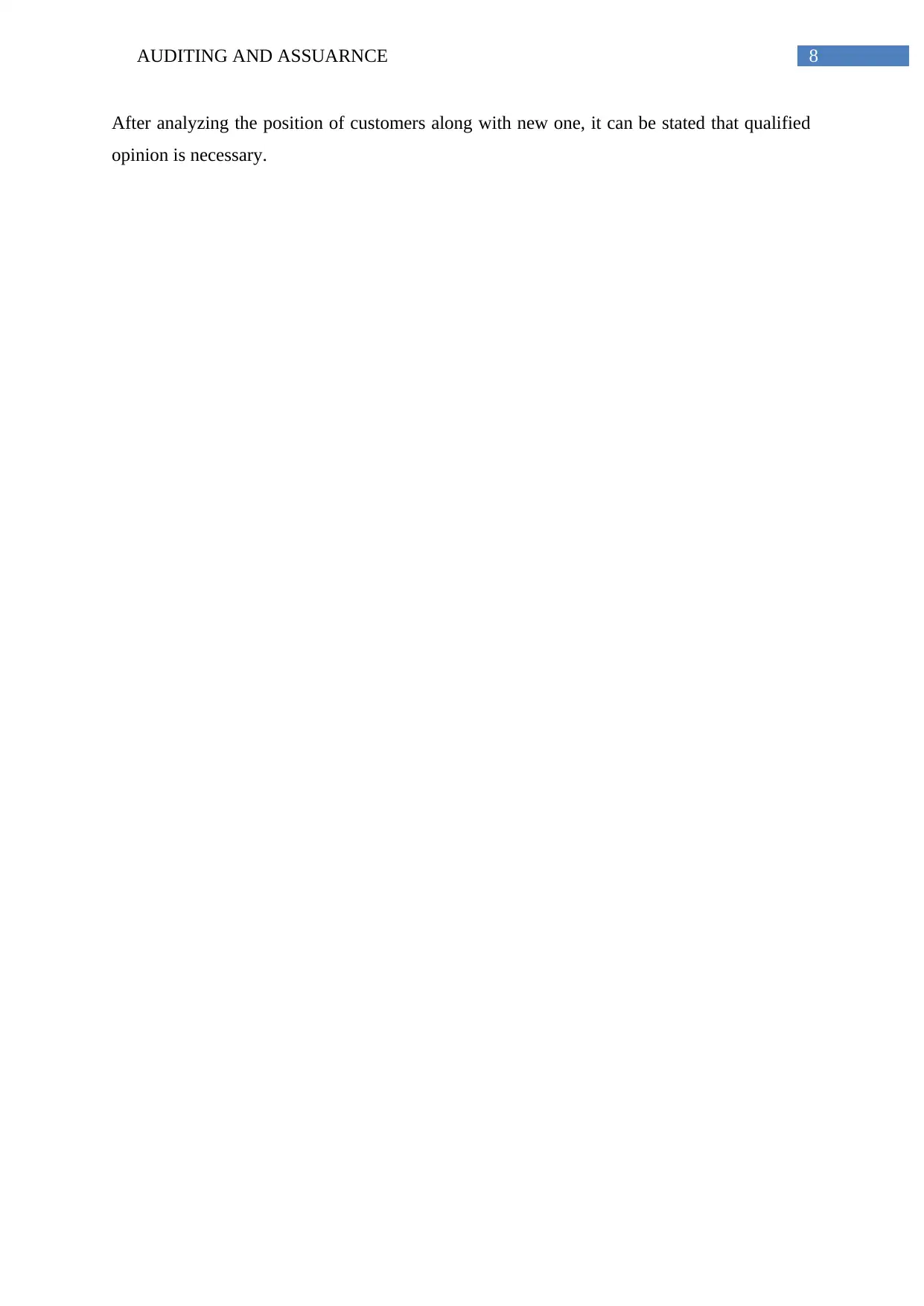
8AUDITING AND ASSUARNCE
After analyzing the position of customers along with new one, it can be stated that qualified
opinion is necessary.
After analyzing the position of customers along with new one, it can be stated that qualified
opinion is necessary.
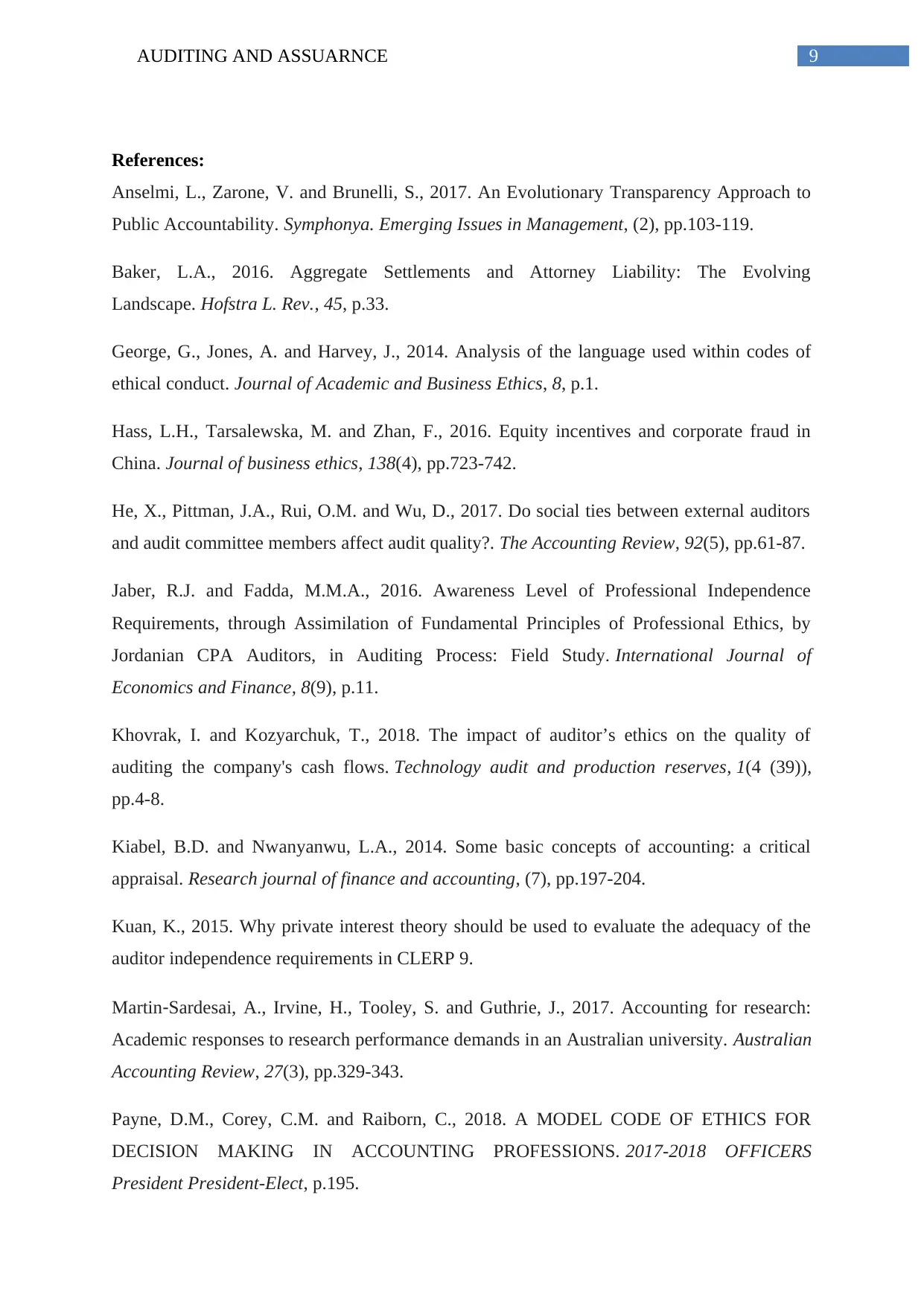
9AUDITING AND ASSUARNCE
References:
Anselmi, L., Zarone, V. and Brunelli, S., 2017. An Evolutionary Transparency Approach to
Public Accountability. Symphonya. Emerging Issues in Management, (2), pp.103-119.
Baker, L.A., 2016. Aggregate Settlements and Attorney Liability: The Evolving
Landscape. Hofstra L. Rev., 45, p.33.
George, G., Jones, A. and Harvey, J., 2014. Analysis of the language used within codes of
ethical conduct. Journal of Academic and Business Ethics, 8, p.1.
Hass, L.H., Tarsalewska, M. and Zhan, F., 2016. Equity incentives and corporate fraud in
China. Journal of business ethics, 138(4), pp.723-742.
He, X., Pittman, J.A., Rui, O.M. and Wu, D., 2017. Do social ties between external auditors
and audit committee members affect audit quality?. The Accounting Review, 92(5), pp.61-87.
Jaber, R.J. and Fadda, M.M.A., 2016. Awareness Level of Professional Independence
Requirements, through Assimilation of Fundamental Principles of Professional Ethics, by
Jordanian CPA Auditors, in Auditing Process: Field Study. International Journal of
Economics and Finance, 8(9), p.11.
Khovrak, I. and Kozyarchuk, T., 2018. The impact of auditor’s ethics on the quality of
auditing the company's cash flows. Technology audit and production reserves, 1(4 (39)),
pp.4-8.
Kiabel, B.D. and Nwanyanwu, L.A., 2014. Some basic concepts of accounting: a critical
appraisal. Research journal of finance and accounting, (7), pp.197-204.
Kuan, K., 2015. Why private interest theory should be used to evaluate the adequacy of the
auditor independence requirements in CLERP 9.
Martin‐Sardesai, A., Irvine, H., Tooley, S. and Guthrie, J., 2017. Accounting for research:
Academic responses to research performance demands in an Australian university. Australian
Accounting Review, 27(3), pp.329-343.
Payne, D.M., Corey, C.M. and Raiborn, C., 2018. A MODEL CODE OF ETHICS FOR
DECISION MAKING IN ACCOUNTING PROFESSIONS. 2017-2018 OFFICERS
President President-Elect, p.195.
References:
Anselmi, L., Zarone, V. and Brunelli, S., 2017. An Evolutionary Transparency Approach to
Public Accountability. Symphonya. Emerging Issues in Management, (2), pp.103-119.
Baker, L.A., 2016. Aggregate Settlements and Attorney Liability: The Evolving
Landscape. Hofstra L. Rev., 45, p.33.
George, G., Jones, A. and Harvey, J., 2014. Analysis of the language used within codes of
ethical conduct. Journal of Academic and Business Ethics, 8, p.1.
Hass, L.H., Tarsalewska, M. and Zhan, F., 2016. Equity incentives and corporate fraud in
China. Journal of business ethics, 138(4), pp.723-742.
He, X., Pittman, J.A., Rui, O.M. and Wu, D., 2017. Do social ties between external auditors
and audit committee members affect audit quality?. The Accounting Review, 92(5), pp.61-87.
Jaber, R.J. and Fadda, M.M.A., 2016. Awareness Level of Professional Independence
Requirements, through Assimilation of Fundamental Principles of Professional Ethics, by
Jordanian CPA Auditors, in Auditing Process: Field Study. International Journal of
Economics and Finance, 8(9), p.11.
Khovrak, I. and Kozyarchuk, T., 2018. The impact of auditor’s ethics on the quality of
auditing the company's cash flows. Technology audit and production reserves, 1(4 (39)),
pp.4-8.
Kiabel, B.D. and Nwanyanwu, L.A., 2014. Some basic concepts of accounting: a critical
appraisal. Research journal of finance and accounting, (7), pp.197-204.
Kuan, K., 2015. Why private interest theory should be used to evaluate the adequacy of the
auditor independence requirements in CLERP 9.
Martin‐Sardesai, A., Irvine, H., Tooley, S. and Guthrie, J., 2017. Accounting for research:
Academic responses to research performance demands in an Australian university. Australian
Accounting Review, 27(3), pp.329-343.
Payne, D.M., Corey, C.M. and Raiborn, C., 2018. A MODEL CODE OF ETHICS FOR
DECISION MAKING IN ACCOUNTING PROFESSIONS. 2017-2018 OFFICERS
President President-Elect, p.195.
Secure Best Marks with AI Grader
Need help grading? Try our AI Grader for instant feedback on your assignments.
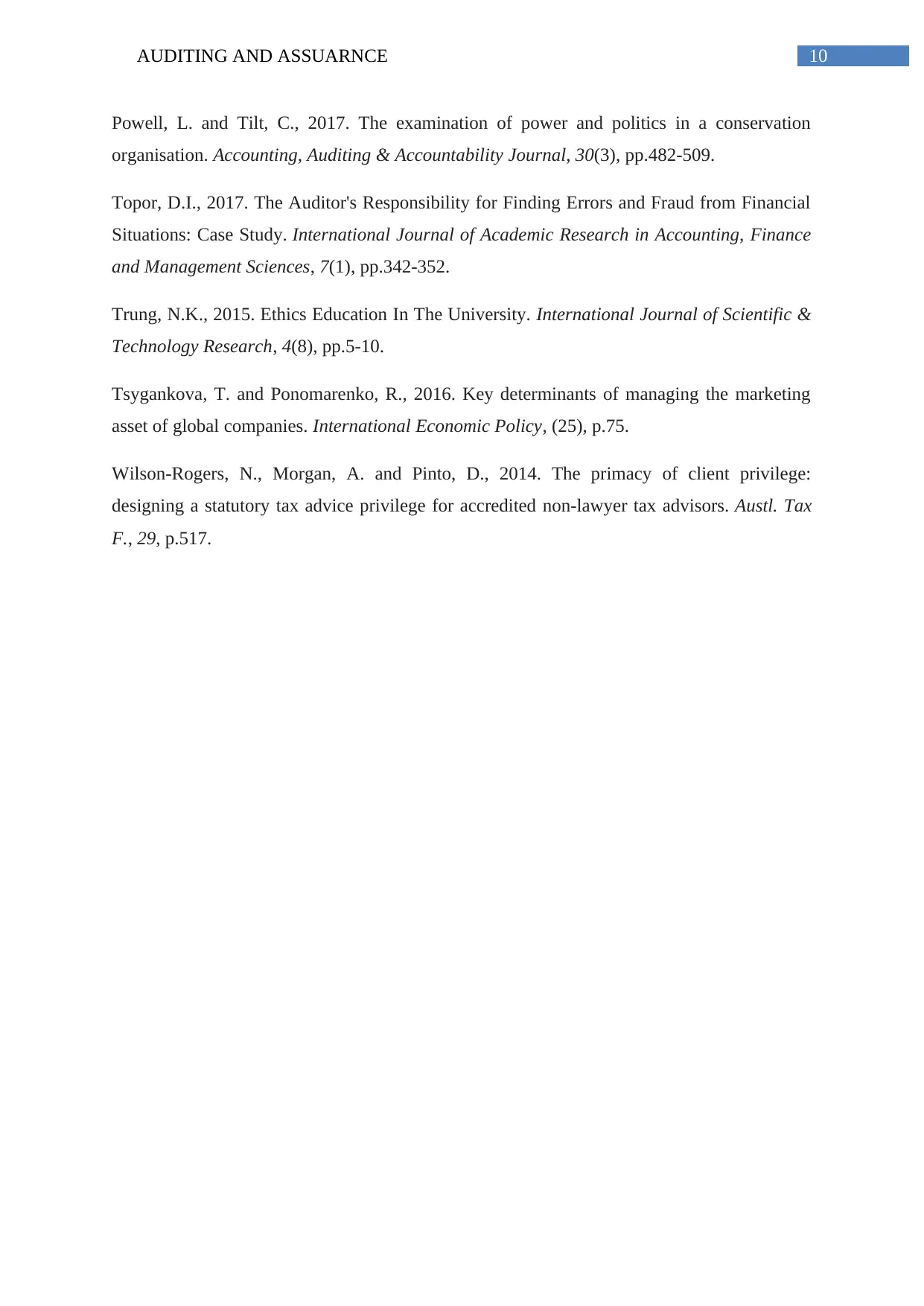
10AUDITING AND ASSUARNCE
Powell, L. and Tilt, C., 2017. The examination of power and politics in a conservation
organisation. Accounting, Auditing & Accountability Journal, 30(3), pp.482-509.
Topor, D.I., 2017. The Auditor's Responsibility for Finding Errors and Fraud from Financial
Situations: Case Study. International Journal of Academic Research in Accounting, Finance
and Management Sciences, 7(1), pp.342-352.
Trung, N.K., 2015. Ethics Education In The University. International Journal of Scientific &
Technology Research, 4(8), pp.5-10.
Tsygankova, T. and Ponomarenko, R., 2016. Key determinants of managing the marketing
asset of global companies. International Economic Policy, (25), p.75.
Wilson-Rogers, N., Morgan, A. and Pinto, D., 2014. The primacy of client privilege:
designing a statutory tax advice privilege for accredited non-lawyer tax advisors. Austl. Tax
F., 29, p.517.
Powell, L. and Tilt, C., 2017. The examination of power and politics in a conservation
organisation. Accounting, Auditing & Accountability Journal, 30(3), pp.482-509.
Topor, D.I., 2017. The Auditor's Responsibility for Finding Errors and Fraud from Financial
Situations: Case Study. International Journal of Academic Research in Accounting, Finance
and Management Sciences, 7(1), pp.342-352.
Trung, N.K., 2015. Ethics Education In The University. International Journal of Scientific &
Technology Research, 4(8), pp.5-10.
Tsygankova, T. and Ponomarenko, R., 2016. Key determinants of managing the marketing
asset of global companies. International Economic Policy, (25), p.75.
Wilson-Rogers, N., Morgan, A. and Pinto, D., 2014. The primacy of client privilege:
designing a statutory tax advice privilege for accredited non-lawyer tax advisors. Austl. Tax
F., 29, p.517.
1 out of 11
Related Documents
Your All-in-One AI-Powered Toolkit for Academic Success.
+13062052269
info@desklib.com
Available 24*7 on WhatsApp / Email
![[object Object]](/_next/static/media/star-bottom.7253800d.svg)
Unlock your academic potential
© 2024 | Zucol Services PVT LTD | All rights reserved.





